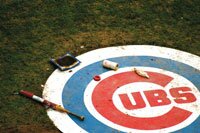THE SPORTS DOCTOR- Hoping against... For Cubs, 100 years become 101

Are Cubs on deck for yet another heartbreak?
BUGSY/HOMETOWN INVASION TOUR
Elizabeth Kübler-Ross identified five stages of grief: shock and denial, anger, bargaining, depression, and then acceptance and hope. She said these five stages are natural human reactions to all kinds of loss, be it death, divorce, addiction, or separation. I know Ms. Kübler-Ross included baseball on her list.
The tears I shed for sports are few and are usually reserved for movies about Rudy, the 1980 Olympic hockey team, or Lou Gehrig.
Occasionally, I get misty over a particularly touching piece on Real Sports, but I've never actually cried over a real game– until last Saturday night. By the seventh-inning stretch, with the Cubs down 3-0 to the Dodgers, I couldn't hold back the tears.
For some people, sports are frivolous at best and ignorant and childish at worst. These detractors refuse to acknowledge that sports can have profound meaning, can be a reflection of life at its finest or most depraved. Instead, they see sports as indulgent and wasteful. To these cynics I offer my tears.
A baseball season is 162 games, the longest in professional sports. A true baseball fan commits half a year to hope, a hefty investment. Expectations can be low or high, but six months of watching hope live and die demands a sustained emotional expenditure only devoted fans can bear.
Every team claims the most devoted fans, but no doubt the Chicago Cubs take the honor. On September 20 of this year, Leo Hildebrand– who was four years old when the Cubs last won a World Series in 1908– got out of his wheelchair and threw the first pitch at Wrigley Field. Not one fan of any other team has seen 100– no, 101– years of life go by without a Championship.
For Hildebrand and other Cubs fans, grief is the natural reaction this October. ESPN and Sports Illustrated had tapped the Cubs to win the World Series, and Cubs' fans concurred. This 2008 season, the losing-est team in baseball didn't just deserve to win the Series; it had earned the crown.
This year the Cubs played beautiful baseball. Carlos Zambrano pitched a no-hitter, the team led the National League with 97 wins and 855 runs, and Kerry Wood stayed healthy. The defense was strong, the pitching formidable, the Cubs were scary-good. As each of the 162 games came and went, the fans' hope rose: "Next year is this year" was the mantra.
But hope is a strange thing, dependent on suffering, perseverance, and despair. To hope is to look beyond suffering, to persevere through despair in anticipation of better things. If there's one thing Cubs' fans know, it's despair, the utter despondency and desperation of being the worst team in baseball, the laughingstock, the accursed. To hope, to believe with all one's heart that all that wreckage is past, is to take a very dangerous risk.
There's no reliable way to figure the total number of Cubs' fans, but with satellite television, satellite radio, cable, and the Internet, it's safe to assume that millions of people felt the 101-ton weight of the Dodgers' heel this past Saturday. In a best-of-five-games series, already down two games to L.A., the Cubs had one last chance to fulfill the hope.
In baseball, each game's loss makes way for the next game's victory. Despite all the errors, all the walks, all the home runs given up in the first two games of the Series, the Cubs had a clean slate for game three.
When I cried on Saturday night, I cried for the 10 men left on base. I cried for checked swings, for thrown bats and lost balls. I cried for a team that shouldered not just a 100-year burden, but the immeasurable weight of a million hearts ready to be broken.
And hearts are broken. The Dodgers swept the Cubs, and fans are still in a state of shock and denial. It may take only nine innings for 100 years to become 101, but arriving at the final stage of grief– acceptance and hope– is going to take a lot longer.
#